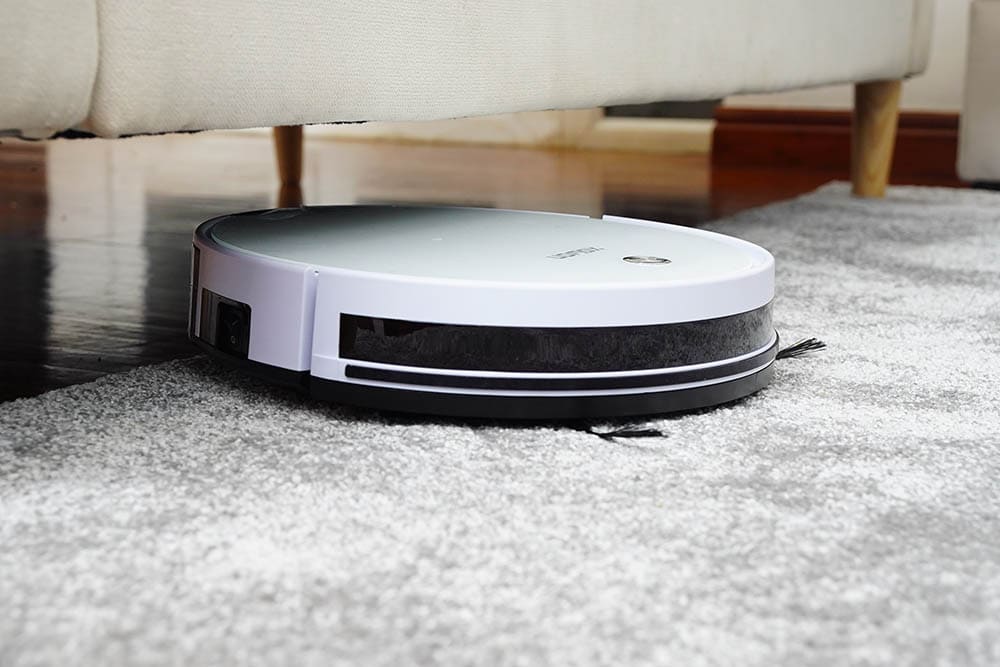How Loud is a Roomba in Decibels (dB)? With Noise Comparison Chart
-
Pete Ortiz
- Last updated:

A few decades ago, the idea of robots taking over various domestic chores seemed like the stuff we’d only see in sci-fi films. However, thanks to rapidly evolving technology, various automatic appliances have entered our homes, unburdening us from monotonous and tedious tasks to make our lives easier.
An excellent example is the iRobot Roomba vacuum cleaner. It’s an automatic cleaner that doesn’t require you to push them around. Just sit back and let them roam around your home, doing all the work for you! However, some users cite the noise levels of these automatic cleaners as their main weakness. But exactly how loud is a Roomba in decibels? Roomba vacuums are relatively quiet, with an average dB rating of 48 to 71 dB
 How Loud is a Decibel?
How Loud is a Decibel?
A decibel (dB) is the standard unit for measuring sound intensity. The higher the dB rating of an appliance or machine, the louder it will be. It is measured using a dB reader that pulses up and down depending on the noise level. Put in perspective, 10–20 dB is a very soft sound, like someone breathing normally or leaves rustling. During a normal conversation, the noise level will range from 50–60 dB, whereas the sound of a noisy restaurant or heavy traffic ranges from 80–90 dB.
Above 90 dB is now what you can consider as loud noise, which includes the sound of power tools, motorcycles, and even rock concerts at 110 dB. At the top of the chart are events such as a rocket launch, with a rating of up to 180 dB.
Fortunately, no vacuum cleaner will reach the noise levels of a rock concert or rocket launch!
How Loud Is a Roomba?
iRobot Roomba vacuums are relatively quiet, with an average dB rating of 48 to 71 dB. As such, the quietest model will be slightly lower in noise than a normal conversation, meaning you can go about your day without noticing it.
Even the loudest model at 71 dB is not too loud and should not interfere much with your home’s comfort. However, for louder cleaners, you might want to leave the vacuum on when you’re away to reduce the level of interference.
Even the loudest Roomba vacuum cleaners are quieter compared to other upright models. Top models like Dyson can get a dB rating as high as 90 dB, which is a lot of noise compared to the measly 71 dBs from the Roomba.
Noise Level Comparison for Different Roomba Models
Various factors determine how loud your Roomba vacuum cleaner will be, including the surface being cleaned, the design of the model, and the vacuum’s suction power. In the table below, we compare the noise levels of different Roomba models when used on carpets vs. hardwood floors to make it easy for you to decide.
| Roomba Model | Noise on Carpets | Noise on Hardwood floors |
| j7+ | 48 | 55 |
| s9+ | 50 | 54 |
| i7+ | 51 | 53 |
| i4 | 61 | 62 |
| 700 series | 66 | 70 |
| 800 series | 66 | 71 |
| 900 series | 67 | 70 |
| 600 series | 67 | 71 |
| 500 series | 68 | 71 |
Conclusion
Although upright vacuums and other household appliances have high decibel levels, Roomba models are not loud. If you have a Roomba operating when you’re working or reading a book, you’re unlikely to be bothered by it. With an average noise level of 60 dB, Roomba models are quieter than the industry average, making them an excellent choice for automatic vacuum cleaners.
- https://www.merriam-webster.com/dictionary/decibel
- https://cleanhomeworld.com/how-loud-is-a-roomba/#:~:text=The%20iRobot%20Roomba%20vacuums%20top,as%20your%20average%20washing%20machine.
- https://lifeonai.com/how-loud-is-a-roomba/
- https://myautomatedpalace.com/how-loud-are-roombas/
- https://livelavishlife.com/how-loud-is-a-roomba/
- https://keepthatshort.com/how-many-decibels-is-a-roomba
Featued Image Credit: Kowon vn, Unsplash
Contents

 How Loud is a Decibel?
How Loud is a Decibel?